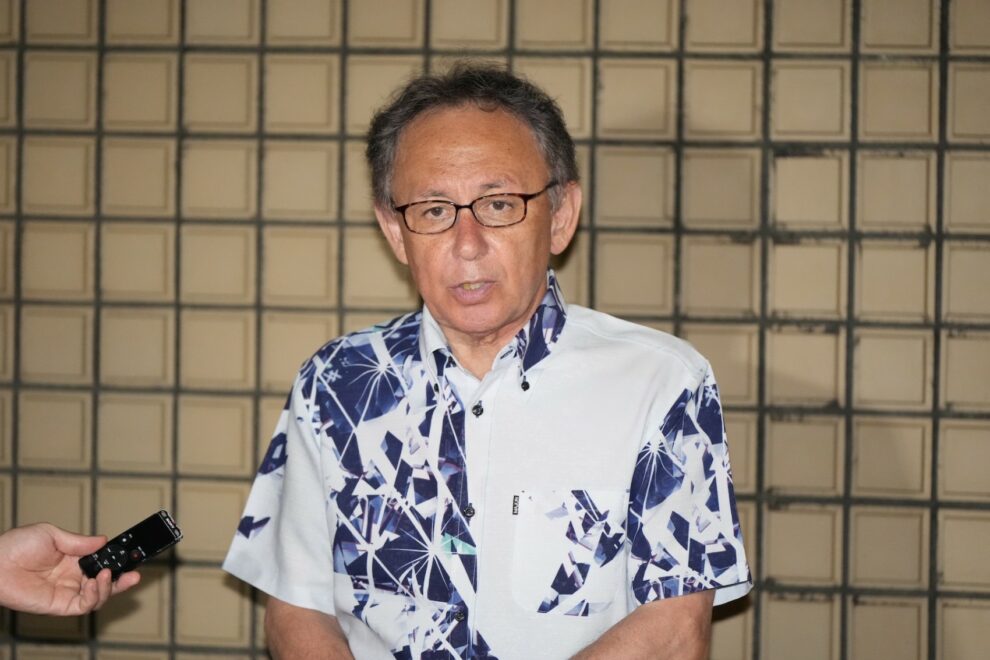NAHA—Candidates backed by a Liberal Democratic Party-led force secured a majority in the Okinawa prefectural assembly, dealing a huge blow to Okinawa Governor Denny Tamaki and his opposition to a U.S. military base plan.
The 48 seats in assembly were up for grabs in the June 16 election. The two sides held 24 seats each before voting.
The opposition camp, including the LDP, Komeito and Nippon Ishin (Japan Innovation Party), gained four seats in the election for 28 in total.
Tamaki’s side, featuring the Constitutional Democratic Party of Japan, the Japanese Communist Party and the Social Democratic Party, lost four seats and now finds itself in a minority position.
“I accept the results with solemnity,” Tamaki told reporters early on June 17.
This is the first time since 2008 for the LDP and Komeito to lead a majority in the prefectural assembly.
The change could prove the death knell for Tamaki’s opposition to the relocation of the U.S. Marine Corps Air Station Futenma in Ginowan in Okinawa Prefecture to the Henoko district in Nago, also in the prefecture.
Tamaki and his allies have waged a long battle to relocate the Futenma base outside the prefecture, and they have run out of legal options to halt the move to Henoko.
The governor has kept fighting, saying that reducing the U.S. military presence in the southern island prefecture is the “people’s will.”
But the latest election indicated that many voters were concerned about other issues.
Anti-relocation candidates appealed for the “realization of a peaceful island” through the continuation of the Tamaki administration.
They cited concerns about the Henoko issue and the rapid reinforcement of the Self-Defense Forces under the central government’s “southwest shift” policy to prepare for possible Chinese military moves.
The pro-Tamaki candidates also raised the LDP slush fund scandal, which has led in part to a string of election losses nationwide for candidates backed by the ruling party.
But criticism over the scandal had a limited impact on the election.
The LDP candidates ran their campaigns with a less-visible partisan color.
They also argued that the central government’s budget for Okinawa’s promotion had been reduced because of Tamaki’s deepening confrontation with Tokyo over the U.S. base issue.
Tamaki has taken legal action against the central government to halt construction of the offshore replacement base, including citing potential environmental destruction.
However, a Supreme Court decision in December last year allowed the central government to use administrative subrogation to approve a design change application for land reclamation off the Henoko district.
The reclamation work has since started there.
Tamaki has come up with a countermeasure proposal, but it will likely be rejected by the new prefectural assembly.
“My opposition to the Henoko relocation is unwavering. But I expect a very difficult situation when it comes to budgetary matters,” Tamaki told reporters. “I will give a sincere and honest explanation and seek understanding in the assembly.”
Voter turnout was 45.26 percent, the lowest ever for an Okinawa prefectural assembly election, according to the prefectural election commission.
Turnout in the previous election was 46.96 percent.
The number of eligible voters on election day was 1,117,389.
A 33-year-old man who works in Ginowan, where the Futenma air station is located, said he voted for an LDP candidate because he wanted more attention focused on child-rearing policies and a health care center project in the city in collaboration with the central government.
“Tamaki and assembly members who support the governor are all about the base issue,” the voter said.
A 48-year-old IT engineer in Naha said he does not approve of the Tamaki administration.
The administration “is too preoccupied with the base issue, and other things are not getting done,” he said.
He said he hopes the assembly will take advantage of Okinawa’s proximity to Taiwan and Southeast Asia to support the development of new businesses.
“I feel bad for those who are working hard (to oppose the relocation), but I think we’ve had enough of the base issue.”
Source: Asahi










